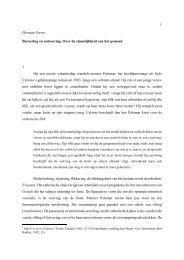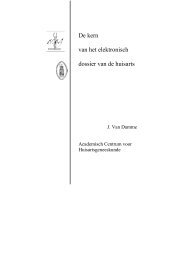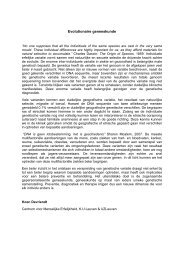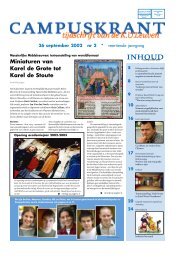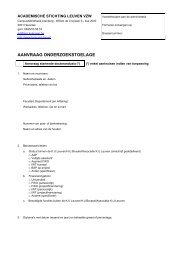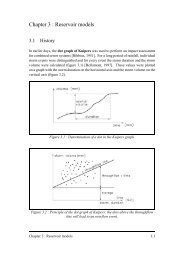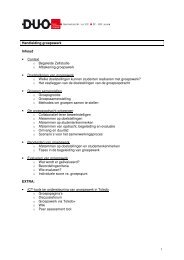- Page 1 and 2:
EQUALITY Guide HR Instruments for E
- Page 3 and 4:
Authors Yanna Van Wesemael ! Machte
- Page 5 and 6:
VLIR-Werkgroep Gelijke Kansen (Eds.
- Page 7 and 8:
6 Equality Guide 3.8. Validating th
- Page 9 and 10:
8 Equality Guide 2. Literature stud
- Page 11 and 12:
10 Equality Guide 5.4. Recommendati
- Page 14 and 15:
Preface At Flemish and at European
- Page 16:
Preface 15 The partners in the tran
- Page 19 and 20:
18 Equality Guide Prof. Dr. Van Cau
- Page 21 and 22:
20 Equality Guide male scientists 1
- Page 24 and 25:
Chapter 1 Personnel development and
- Page 26 and 27:
Chapter 1 ! Personnel development a
- Page 28 and 29:
Chapter 1 ! Personnel development a
- Page 30 and 31:
Chapter 1 ! Personnel development a
- Page 32 and 33:
Chapter 1 ! Personnel development a
- Page 34 and 35:
Chapter 1 ! Personnel development a
- Page 36 and 37:
Chapter 1 ! Personnel development a
- Page 38 and 39:
Chapter 1 ! Personnel development a
- Page 40 and 41:
Chapter 1 ! Personnel development a
- Page 42 and 43:
Chapter 1 ! Personnel development a
- Page 44 and 45:
Chapter 1 ! Personnel development a
- Page 46 and 47:
Chapter 1 ! Personnel development a
- Page 48 and 49:
Chapter 1 ! Personnel development a
- Page 50 and 51:
Chapter 1 ! Personnel development a
- Page 52 and 53:
Chapter 1 ! Personnel development a
- Page 54 and 55:
Chapter 1 ! Personnel development a
- Page 56 and 57:
Chapter 1 ! Personnel development a
- Page 58 and 59:
Chapter 1 ! Personnel development a
- Page 60 and 61:
Chapter 1 ! Personnel development a
- Page 62 and 63:
Chapter 1 ! Personnel development a
- Page 64 and 65:
Chapter 1 ! Personnel development a
- Page 66 and 67:
Chapter 1 ! Personnel development a
- Page 68 and 69:
Chapter 1 ! Personnel development a
- Page 70 and 71:
Chapter 1 ! Personnel development a
- Page 72 and 73:
Chapter 1 ! Personnel development a
- Page 74 and 75:
Chapter 2 Career paths: recruitment
- Page 76 and 77:
Chapter 2 ! Career paths: recruitme
- Page 78 and 79:
Chapter 2 ! Career paths: recruitme
- Page 80 and 81:
Chapter 2 ! Career paths: recruitme
- Page 82 and 83:
Chapter 2 ! Career paths: recruitme
- Page 84 and 85:
Chapter 2 ! Career paths: recruitme
- Page 86 and 87:
Chapter 2 ! Career paths: recruitme
- Page 88 and 89:
Chapter 2 ! Career paths: recruitme
- Page 90 and 91:
Chapter 2 ! Career paths: recruitme
- Page 92 and 93:
Chapter 2 ! Career paths: recruitme
- Page 94 and 95:
Chapter 2 ! Career paths: recruitme
- Page 96 and 97:
Chapter 2 ! Career paths: recruitme
- Page 98 and 99:
Chapter 2 ! Career paths: recruitme
- Page 100 and 101:
Chapter 2 ! Career paths: recruitme
- Page 102 and 103:
Chapter 2 ! Career paths: recruitme
- Page 104 and 105:
Chapter 2 ! Career paths: recruitme
- Page 106 and 107:
Chapter 2 ! Career paths: recruitme
- Page 108 and 109:
Chapter 2 ! Career paths: recruitme
- Page 110 and 111:
Chapter 2 ! Career paths: recruitme
- Page 112 and 113:
Chapter 2 ! Career paths: recruitme
- Page 114 and 115:
Chapter 2 ! Career paths: recruitme
- Page 116 and 117:
Chapter 2 ! Career paths: recruitme
- Page 118 and 119:
Chapter 2 ! Career paths: recruitme
- Page 120 and 121:
Chapter 2 ! Career paths: recruitme
- Page 122 and 123:
Chapter 2 ! Career paths: recruitme
- Page 124 and 125:
Chapter 2 ! Career paths: recruitme
- Page 126 and 127:
Chapter 2 ! Career paths: recruitme
- Page 128 and 129:
Chapter 2 ! Career paths: recruitme
- Page 130 and 131:
Chapter 2 ! Career paths: recruitme
- Page 132 and 133:
Chapter 3 Career management Esther
- Page 134 and 135:
Chapter 3 ! Career management 133 F
- Page 136 and 137:
Chapter 3 ! Career management 135 0
- Page 138 and 139:
Chapter 3 ! Career management 137 T
- Page 140 and 141:
Chapter 3 ! Career management 139 2
- Page 142 and 143:
Chapter 3 ! Career management 141 T
- Page 144 and 145:
Chapter 3 ! Career management 143 Z
- Page 146 and 147:
Chapter 3 ! Career management 145 T
- Page 148 and 149:
Chapter 3 ! Career management 147 t
- Page 150 and 151:
Chapter 3 ! Career management 149 t
- Page 152 and 153:
Chapter 3 ! Career management 151 a
- Page 154 and 155:
Chapter 3 ! Career management 153 t
- Page 156 and 157:
Chapter 3 ! Career management 155 n
- Page 158 and 159:
Chapter 3 ! Career management 157 u
- Page 160 and 161:
Chapter 3 ! Career management 159 G
- Page 162 and 163:
Chapter 3 ! Career management 161 4
- Page 164 and 165:
Chapter 3 ! Career management 163 I
- Page 166 and 167:
Chapter 3 ! Career management 165 4
- Page 168 and 169:
Chapter 3 ! Career management 167 t
- Page 170 and 171:
Chapter 3 ! Career management 169 t
- Page 172 and 173:
Chapter 3 ! Career management 171 a
- Page 174 and 175:
Chapter 3 ! Career management 173 I
- Page 176 and 177:
Chapter 3 ! Career management 175 s
- Page 178:
Chapter 3 ! Career management 177 a
- Page 181 and 182:
180 Equality Guide 1.1. Problem def
- Page 183 and 184:
182 Equality Guide reason, many wom
- Page 185 and 186:
184 Equality Guide not correspond t
- Page 187 and 188:
186 Equality Guide to 76% of the fe
- Page 189 and 190:
188 Equality Guide 3.1. Qualitative
- Page 191 and 192:
190 Equality Guide listed: the need
- Page 193 and 194:
192 Equality Guide to be improved?
- Page 195 and 196:
194 Equality Guide woman has to cho
- Page 197 and 198:
196 Equality Guide The plan was to
- Page 199 and 200:
198 Equality Guide 4. Category: com
- Page 201 and 202:
200 Equality Guide Table 25: The di
- Page 203 and 204:
202 Equality Guide around us. She l
- Page 205 and 206:
204 Equality Guide from a bird pers
- Page 207 and 208:
206 Equality Guide short: how do I
- Page 209 and 210:
208 Equality Guide Women are often
- Page 211 and 212:
210 Equality Guide For women it is
- Page 213 and 214:
212 Equality Guide congratulate peo
- Page 215 and 216: 214 Equality Guide Need support? !
- Page 217 and 218: 216 Equality Guide sumption, etc. I
- Page 219 and 220: 218 Equality Guide In terms of grou
- Page 221 and 222: 220 Equality Guide Both groups were
- Page 223 and 224: 222 Equality Guide The approach is
- Page 225 and 226: 224 Equality Guide documents can be
- Page 227 and 228: 226 Equality Guide Tips for day 4 !
- Page 229 and 230: 228 Equality Guide ! Career ambitio
- Page 231 and 232: 230 Equality Guide ! Introduce your
- Page 233 and 234: 232 Equality Guide skills and striv
- Page 235 and 236: 234 Equality Guide 1.1. Problem def
- Page 237 and 238: 236 Equality Guide change of experi
- Page 239 and 240: 238 Equality Guide David Clutterbuc
- Page 241 and 242: 240 Equality Guide ‘on-going deve
- Page 243 and 244: 242 Equality Guide mentoring in its
- Page 245 and 246: 244 Equality Guide table clearly in
- Page 247 and 248: 246 Equality Guide shows that many
- Page 249 and 250: 248 Equality Guide generated on the
- Page 251 and 252: 250 Equality Guide women. The train
- Page 253 and 254: 252 Equality Guide Table 30: The me
- Page 255 and 256: 254 Equality Guide 3.7.5. Catholic
- Page 257 and 258: 256 Equality Guide 4. Instrument an
- Page 259 and 260: 258 Equality Guide For whom: Use: g
- Page 261 and 262: 260 Equality Guide baas worden’ 2
- Page 263 and 264: 262 Equality Guide neutral stance a
- Page 265: 264 Equality Guide Three out of fou
- Page 269 and 270: 268 Equality Guide and were satisfi
- Page 271 and 272: 270 Equality Guide fame of mentorin
- Page 274 and 275: General conclusion The goal of this
- Page 276 and 277: References General introduction Bla
- Page 278 and 279: References 277 nr. 3, 303-322. Mill
- Page 280 and 281: References 279 She Figures 2003, Wo
- Page 282 and 283: References 281 In: Tijdschrift voor
- Page 284: References 283 Gelijkekansenbeleid
- Page 287 and 288: 286 Equality Guide Table 1.2: Diffe
- Page 289 and 290: 288 Equality Guide Intimidation/bul
- Page 291 and 292: 290 Equality Guide Discrimination b
- Page 293 and 294: 292 Equality Guide Hetero/ LGB Ns (
- Page 295 and 296: 294 Equality Guide Chapter 2 Table
- Page 297 and 298: 296 Equality Guide Table 2.5: Answe
- Page 299 and 300: 298 Equality Guide obstacle for wom
- Page 301 and 302: 300 Equality Guide Appendix 4.2: Re



